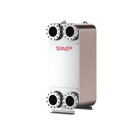SWEP gains BSRIA recognition

There has long been an issue about the claimed performance of heat exchangers compared to what they deliver in practice. They are often oversized or deliver heat loads lower than specified, leading to frustration and disappointment on the part of the customer.
One of the most complicated specifications to deliver is the market requirement of 1K; meaning 1 degree between the primary source (the plant) and secondary side (i.e. the space heating or cooling).
Christer Frennfelt, manager for SWEP’s Consultant and Utility business, explains that BSRIA has recently tested a SWEP 1K heat exchanger to verify its performance.
“BSRIA built a bespoke test rig with automatic data capture capability that fully tested the heat exchanger’s actual performance limits, rather than those based on extrapolated standard factory test data.”
“The resulting comprehensive and authoritative report assures consultants and our clients that the SWEP heat exchanger’s actual product performance closely matches predicted performance, even at very low approach temperatures.”
SWEP units have also been out for performance testing for different projects by a third party and achieved very good results. SWEP brazed plate heat exchangers are now also certified according to the independent North American institute AHRI, which makes third-party testing unnecessary.







